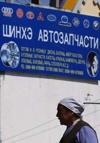On December 23 Kazakh President Nursultan Nazarbayev wrapped up his first three-day visit to Beijing since his reelection in December 2005. The trip, characterized as “a breakthrough” in bilateral relations by the official mouthpiece Kazakhstanskaya pravda, was marked by series of landmark agreements aimed at boosting economic and trade ties and eliminating any remaining stumbling blocks to a regional partnership. However, the widespread feeling of euphoria around Nazarbayev’s Beijing trip risks being overshadowed by mounting Sinophobia in Kazakhstan.
Technorati Tags: Kazakhstan
The talks between Nazarbayev and Chinese President Hu Jintao and their joint statement of cooperation for the 21st century showed all the signs of a model partnership between Kazakhstan and China. Hu and Nazarbayev signed 10 agreements relating to scientific and cultural ties, transport communications, bilateral trade, energy resources, border control and customs regulations, trans-border rivers, and labor migration. Before leaving Beijing, a visibly optimistic Nazarbayev told the press that China and Kazakhstan had finally eliminated all their border problems and laid a solid foundation for mutual trust and friendship. He stressed that the most important outcome of his talks with Hu was the conclusion of an agreement on joint monitoring of the environmental situation around the Irtysh River basin. Referring to earlier Chinese plans to divert the river for agricultural use, which threatened to cause water shortages in the downstream areas of South Kazakhstan, Nazarbayev said Hu had promised to refrain from any steps “that would damage Kazakhstan’s economy” (Express-K, December 26).
At the same time, he said, “It would be wrong to conclude that Kazakh-Chinese relations are developing exceptionally in the positive direction. We have some issues on which solution must be reached today. We must come to a compromise.” In particular, Nazarbayev listed Kazakhstan’s trade imbalance with China as hampering further bilateral economic activities. The Kazakh president also added that “lately numerous critical publications appeared in the [Kazakh] press relating to ‘disproportions’ in the Chinese participation in developing oil and gas resources of Kazakhstan.” He was clearly alluding to the illegal Chinese workforce smuggled into Kazakhstan by Chinese oil and gas companies operating in Aktobe region, West Kazakhstan. In his words, a satisfactory solution for Kazakhstan would be to reduce the number of Chinese workers hired by Chinese-owned companies by 70% and replace them with local workers (Kazakhstan TV Channel, December 24).
Broadly speaking, the vague economic and demographic apprehensions Nazarbayev expressed in Beijing are nothing more than a reflection of the public anxiety in Kazakhstan that has repeatedly emerged since the establishment of diplomatic relations with China 15 years ago. But this was the first time the Kazakh leader publicly aired the popular unease during an official visit to China.
Last November political scientists from Kazakhstan gathered in Almaty to discuss the threat of Chinese economic and demographic expansion. The debate came in the wake of an agreement concluded by Nation’s Energy Company of Canada and the Chinese CITIC Investment Fund on the sale of the assets of the Chinese-owned Karazhambasmunay oilfield in Kazakhstan. The deal sent a wave of protests through the Kazakh parliament. But the director of the Risk Assessment Group research center, Dosym Satpayev, believes the real cause for the Kazakh government constantly loosing economic battle with China is rooted in endemic corruption in the corridors of power.
Satpayev believes that some influential members of government have already formed pro-Chinese forces to lobby for Chinese companies and to make the government conclude agreements with the Chinese to the detriment of Kazakhstan’s economy. Economist Oraz Zhandosov has proposed a new scheme according to which Kazakhstan should own 50% of the assets in the oil and gas sector, leaving the remaining half of the assets to be divided among foreign companies. Economic analysts point out that Kazakhstan is increasingly assuming the role of cheap raw materials supplier for China and becoming a dumping ground for low-priced Chinese goods, while Kazakhstan’s textile industry has already lost the domestic market to its neighbor (Megapolis, December 22).
Despite the growing resentment over Chinese economic expansion, Kazakhstan recognizes the vital importance of economic, political and military partnership with Beijing. According to reports, as of December 1, 1.788 million tons of Kazakh oil had been pumped to China through the Atasu-Alashankou oil pipeline, which was put into operation on December 15, 2005. By the year 2010 oil deliveries to China are expected to increase up to 20 million tons annually. Kazakhstan is considering building a second phase of an oil pipeline to China linking Kumkol oilfields with Atasu, as well as a gas pipeline to the Xinjiang autonomous region. Other projects include the railway link from Kazakhstan to China through the Khorgos border trade zone. The trade volume by the end of the year will reach $8 billion.
Nazarbayev made a final gesture of support for Chinese territorial integrity by paying visits to Hong Kong and Macau and reaffirming Kazakhstan’s adherence to the one-China principle regarding Taiwan. Chinese propaganda duly appreciated Astana’s unequivocal stance on Taiwan. But with the booming economy of the unruly, Muslim-populated Xinjiang, Kazakhstan is likely to face more than one political dilemma in the future.
Photo source: Gov.CN
—








